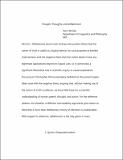Thought, thoughts, and deflationism
Author(s)
McGee, Vann
Download11098_2016_656_ReferencePDF.pdf (360.9Kb)
OPEN_ACCESS_POLICY
Open Access Policy
Creative Commons Attribution-Noncommercial-Share Alike
Terms of use
Metadata
Show full item recordAbstract
Deflationists about truth embrace the positive thesis that the notion of truth is useful as a logical device, for such purposes as blanket endorsement, and the negative thesis that the notion doesn’t have any legitimate applications beyond its logical uses, so it cannot play a significant theoretical role in scientific inquiry or causal explanation. Focusing on Christopher Hill as exemplary deflationist, the present paper takes issue with the negative thesis, arguing that, without making use of the notion of truth conditions, we have little hope for a scientific understanding of human speech, thought, and action. For the reference relation, the situation is different. Inscrutability arguments give reason to think that a more-than-deflationary theory of reference is unattainable. With respect to reference, deflationism is the only game in town.
Date issued
2016-03Department
Massachusetts Institute of Technology. Department of Linguistics and PhilosophyJournal
Philosophical Studies
Publisher
Springer Netherlands
Citation
McGee, Vann. “Thought, Thoughts, and Deflationism.” Philosophical Studies 173.12 (2016): 3153–3168.
Version: Author's final manuscript
ISSN
0031-8116
1573-0883